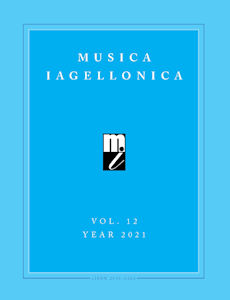Inventory of music prints from the bookshop of Franz Jakob Mertzenich (Kraków 1613)
Inventory of music prints from the bookshop of Franz Jakob Mertzenich (Kraków 1613)
Author(s): Aleksandra PatalasSubject(s): Music, 17th Century, History of Art
Published by: Musica Iagellonica Sp. z o.o.
Keywords: Mertzenich Franz Jakob; music inventory; music prints; 17th-century music; Italian music;
Summary/Abstract: The main purpose of the paper is to characterise and present the contents of the music inventory (1613) from the Kraków bookshop that used to belong to Franz Jakob Mertzenich. The document, written down shortly after his death and currently kept at the National Archives in Kraków, is not known in detail to musicologists. Mertzenich, born in Cologne, probably came to Kraków in 1602 and gained his professional experience working in the local bookshop founded in 1578 by Zachäus Kesner. In 1607, Mertzenich served there as secretary, and from around 1608 he was a trade agent. He repeatedly travelled to the book fair in Frankfurt am Main to make professional contacts. After obtaining city rights in Kraków (1610), Mertzenich opened his own shop and became a large-format bookseller. He was mainly interested in importing books from leading printing centres in Europe: German, Italian, French, Swiss and Dutch ones. His offer embraced items in the field of theology, philosophy, law, history, geography, literature, grammar, rhetoric, mathematics, medicine, chemistry, music, etc. The inventory includes a total of 1606 book titles, among them ca. 115 music editions which were printed mainly in Italy. Generally, Mertzenich was selling relatively new prints, issued after 1600. The music publications contained predominantly vocal pieces (with or without instrumental accompaniment). The majority of works represent the Catholic church music. One can identify only three titles containing instrumental compositions. Very intriguing is Mertzenich’s broad offer of polychoral music, not only for two, but also for three and four choirs. The profile of the repertoire may indicate that he imported music books mainly for the Royal Chapel. Probably, his offer was also directed to some church ensembles or those maintained by magnates, as well as to musically educated nobility and townspeople. The inventory in question is a unique and invaluable source of information, because, apart from the similar document drawn up in 1602 (after Kesner’s death), we do not know any Polish inventories of music materials from the first half of the 17th century.
Journal: Musica Iagellonica
- Issue Year: 12/2021
- Issue No: 1
- Page Range: 27-55
- Page Count: 29
- Language: English

